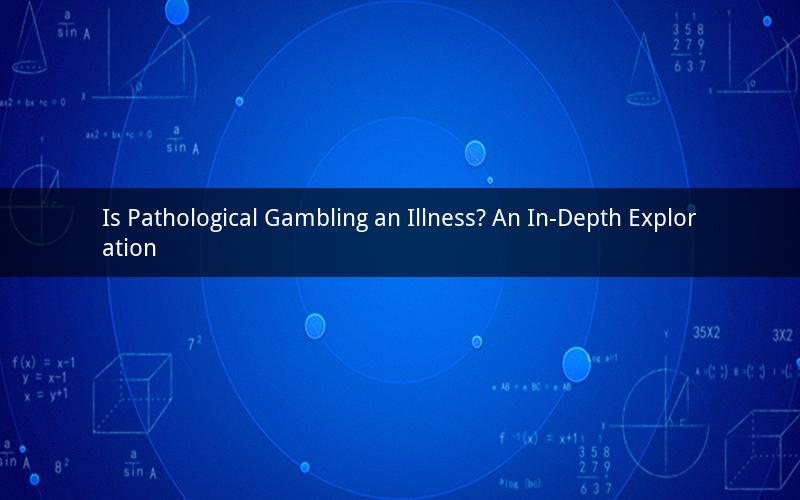
Pathological gambling, also known as gambling disorder, has been a topic of great debate and controversy in recent years. While some view it as a mere bad habit, others argue that it is an actual mental illness. This article aims to delve into the various aspects of pathological gambling, examining its definition, symptoms, causes, treatment, and societal impact.
Defining Pathological Gambling
Pathological gambling is defined as an impulse control disorder characterized by an inability to resist the urge to gamble, despite the negative consequences it may have on one's life. According to the American Psychiatric Association (APA), pathological gambling is classified as a mental health condition in the Diagnostic and Statistical Manual of Mental Disorders (DSM-5).
Symptoms of Pathological Gambling
The symptoms of pathological gambling can vary from person to person, but some common signs include:
1. Inability to control the urge to gamble, even when it causes significant problems in one's life.
2. Needing to gamble with increasing amounts of money to achieve the desired excitement.
3. Feeling restless or irritable when attempting to cut down or stop gambling.
4. Repeated failed attempts to stop gambling.
5. Gambling to escape problems or feelings of guilt.
6. Risking or losing a significant amount of money, property, or other possessions due to gambling.
7. Lying to family, friends, or therapists about the extent of one's gambling.
8. Relating to gambling as a way to make money quickly.
Causes of Pathological Gambling
The exact cause of pathological gambling is not yet fully understood, but it is believed to be influenced by a combination of genetic, environmental, and psychological factors. Some potential causes include:
1. Genetic predisposition: Research suggests that there may be a genetic component to pathological gambling, as it tends to run in families.
2. Environmental factors: Exposure to gambling at an early age, living in a culture that promotes gambling, or having a family member with a gambling problem can increase the risk of developing pathological gambling.
3. Psychological factors: Individuals who are prone to impulsive behaviors, have low self-esteem, or are dealing with stress may be more susceptible to developing pathological gambling.
Treatment for Pathological Gambling
Treatment for pathological gambling typically involves a combination of therapy, medication, and support groups. Some common treatment approaches include:
1. Cognitive-behavioral therapy (CBT): CBT helps individuals identify and change the thoughts and behaviors that contribute to their gambling problem.
2. Family therapy: Family therapy can help improve communication and support within the family, which can be beneficial for both the gambler and their loved ones.
3. Support groups: Support groups such as Gamblers Anonymous can provide individuals with a sense of community and support from others who are dealing with similar issues.
4. Medication: In some cases, medication may be prescribed to help manage symptoms of anxiety, depression, or other co-occurring disorders.
Societal Impact of Pathological Gambling
Pathological gambling has a significant impact on individuals, families, and society as a whole. Some of the consequences include:
1. Financial problems: Pathological gamblers often experience significant financial losses, which can lead to debt, bankruptcy, and even homelessness.
2. Relationship problems: Gambling can strain relationships with family and friends, as it may lead to lying, cheating, and other dishonest behaviors.
3. Legal problems: Individuals with a gambling problem may engage in illegal activities to support their habit, such as theft or fraud.
4. Mental health issues: Pathological gambling is often associated with other mental health conditions, such as depression, anxiety, and substance abuse.
Frequently Asked Questions
1. Q: Can pathological gambling be cured?
A: While there is no guaranteed cure for pathological gambling, treatment can help individuals manage their symptoms and reduce the frequency and severity of their gambling behavior.
2. Q: Is pathological gambling a form of addiction?
A: Yes, pathological gambling is considered an addiction, as it shares many characteristics with other addictive behaviors, such as alcoholism and drug addiction.
3. Q: How common is pathological gambling?
A: The prevalence of pathological gambling varies by country, but it is estimated that approximately 1-2% of the general population has a gambling problem.
4. Q: Can pathological gambling be prevented?
A: While there is no sure way to prevent pathological gambling, individuals can reduce their risk by avoiding risky behaviors, such as gambling with money they cannot afford to lose.
5. Q: Is pathological gambling a crime?
A: Pathological gambling itself is not a crime, but the illegal activities that may result from a gambling problem, such as theft or fraud, can be considered criminal offenses.
In conclusion, pathological gambling is a complex and multifaceted issue that requires a comprehensive approach to treatment and support. While the exact cause of pathological gambling is not yet fully understood, it is clear that it is a serious mental health condition that can have devastating consequences for individuals and their loved ones. By raising awareness and providing appropriate resources, we can help those affected by pathological gambling to seek help and improve their quality of life.